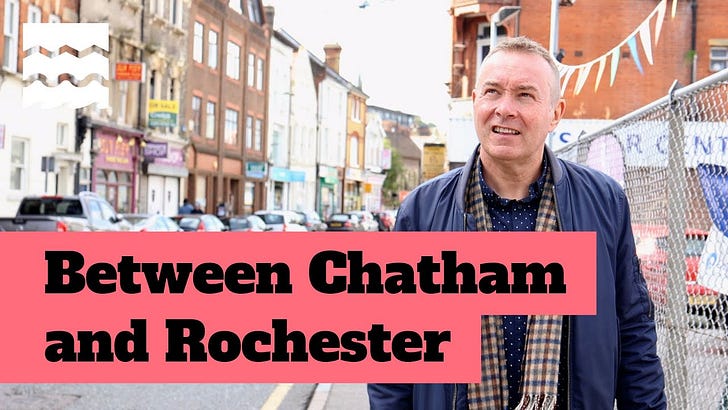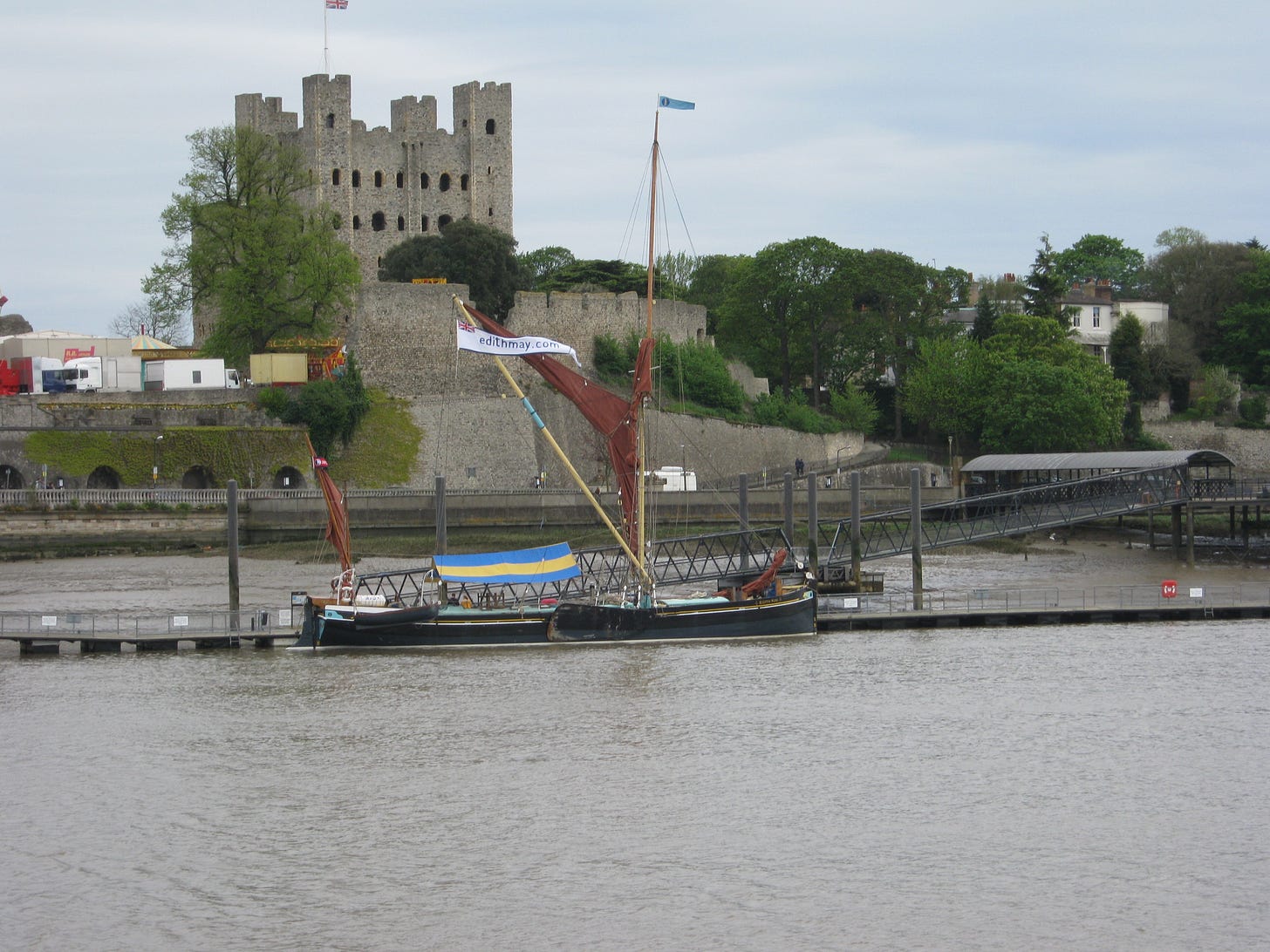Do Not Alight
Remembering the old, closed-down station at Rochester, a gateway to a tourist haven and the Wild West of the Medway Towns
Travelling through Rochester, the train passed through the former railway station, now adorned with DO NOT ALIGHT signs. It was abandoned in December 2015 when a new one opened a short distance down the line. The new station has views of the castle and cathedral, and is more central for tourists and locals alike. The old one is in a less pretty part of town.
Rochester High Street is split by a busy road. Star Hill marks the end of the section where the castle and cathedral lie, where shops and restaurants sport Dickensian names, and Dickens’ writing chalet is located, having been moved from his former home at Gads Hill Place. No tourist destinations are marked on the other side of Star Hill, though in some ways it has more of a genuinely Dickensian feel. The old railway station is on the wrong side of Star Hill.
In the early nineties, I worked in the tourist part of Rochester High Street, in the Probation Office, closed and converted into flats decades ago. In my first week in that job, the body of Glenda Potter, a sex worker, was found in a church car park nearby, where some of the Probation Officers parked their cars. Glenda Potter’s murderer has never been caught.
There was a newsagent opposite the Probation Office. Rod Hull, he of Emu fame, lived in Rochester. I often spotted him from my office window, as he puffed on a curly pipe, stepping into the newsagent to buy tobacco. I occasionally brought my children into work, and allowed them to go across to the shop alone to buy sweets. One New Year's Eve, a young man was fatally stabbed in the doorway of that shop.
In the daytime, Rochester had a reputation as a pleasant tourist destination, where coach parties stopped for a tea, a wee, and a wander round the cathedral. In the evening, it had a different vibe. I ran training courses for volunteers in Rochester Probation Office some evenings. My admin assistant joined us one time, and on the way home, having just missed a train from Rochester, she decided to walk on to Chatham Station. A taxi driver pulled up and said that it was a risky place to walk. Kerb-crawlers frequented that area; she could be mistaken for a ‘prostitute’. He carried her free of charge on to Chatham Station.
That stretch of Rochester High Street by the old railway station and on to Chatham was run down and unattractive in the nineties. A young couple I knew moved into a flat along there, and were troubled by men ringing the doorbell looking for the sex worker that had lived there before them. A woman I got chatting to at a bus stop in Rochester told me that one night, when she was waiting for a lift, a sex worker had approached her and asked her to move on, thinking that the woman was trying to steal her customers. ‘They must have old ones,’ she said to me, meaning sex workers. She was in her sixties or seventies.
In another job, my office sat on the border of Rochester and Chatham with parking at the side of the building. We regularly saw discarded knickers and used condoms along there. I write with no judgement of those that work selling sex. It's an unsafe and unglamorous profession, as the poor woman whose body was found in the car park attests. But it did give a kind of Wild West feel to the Medway Towns at night.
Incidentally, I came to know one of Glenda Potter’s friends, a client in the job that was based on the Rochester-Chatham border. An older man with mental health problems and learning difficulties, he had valued Glenda’s company, and she had sometimes brought him shopping. It gave me an insight into the person behind the lurid details of her death, outlined in the press.
In my younger days, travelling home on my own at night, a cab was the safest option. Outside the old railway station you couldn't step into a waiting cab, you had to go into the office. This was almost as scary as walking home alone. Any hesitation at the grille where the cab controller sat was met with a wide-eyed glare and a demand to state your destination. He would then direct you to the waiting room filled with smoke and sundry characters in various states of inebriation. My preference would have been to stand outside, but that would risk missing the shout when the scary controller called that your cab was waiting.
The High Street from the old station to Chatham is now known by its historical name, Intra. Alongside the inevitable new-builds overlooking the River Medway, older buildings have been repurposed as arts centres, like Intra Arts in the old Featherstone’s building. Hulkes Lane, the site of the former Hulkes Brewery and later the Lion Brewery, is home to several artists’ studios, as is Sun Pier House, which has a gallery, café, and event spaces. The Medway Little Theatre along that stretch continues to thrive. There are small businesses, independent pubs, restaurants and cafés, some hosting live music events.
Local historian and chair of the City of Rochester Society, Rob Flood (seen in the video above), helps to keep the colourful past of the area alive with his history walks and talks. The Intra area has a history as a haven for the LGBTQ+ community, with The Ship Inn a long standing safe haven. The Ship stands opposite Chatham Memorial Synagogue, and the Local Authority Substack, dated 24 January 2025, states: ‘This year, the Synagogue and the Ship Inn are being lit up in pink, with support from the City of Rochester Society’s Rob Flood, to commemorate the pink triangle that was added to the clothing of members of the LGBT+ community who were imprisoned in concentration camps.’
I have been to one of Rob’s talks about the LGBTQ+ history of the Medway Towns. I particularly remember the story of ‘Mr Richard’ who owned a hairdressing salon, Rulon of London and Paris, in the late 1960s. Mr Richard would occasionally come into work in drag and dye his poodle the same colour as the wig he was wearing that day.
Rochester remains a wonderful blend of tweeness, well-known history and a less tourist-worthy, but no less interesting, past. It’s steeped in Dickensia, has a Norman castle, and a cathedral dating back to 604 AD. Alongside this is a lesser-known past, a seedier side, and Rochester is much the richer for it. All the Medway Towns, in fact, have a gritty grounding, a unique flavour that keeps us locals here. I'm not a native; I'm a Down From London, having moved to Strood, just across the river from Rochester, in 1988. I have tried living elsewhere but, to quote Michael Corleone in The Godfather, Part III, ‘Just as I thought I was out, they pull me back in.’ My daughters, too, returned to Medway after university. I can't imagine living elsewhere.
I rarely venture into Rochester in the evenings these days. On my way to a literary event one Saturday evening last November, I walked past an ambulance crew attending to a man on the ground, a small crowd of drinkers surrounding him. It was not yet seven o'clock and the high street was buzzing, the tourists having left the locals to their revels. Later, the doors of Aaron Stone's nightclub would open. I'm told it's still a cattle market, reminding me of my one experience of it in my thirties, when I was recently out of a long marriage. Having gone with a new boyfriend, every time he left me to go to the bar or the loo, I was hit on by other men. I could see them homing in on me, scanning the place for lone women, and racing across the dance floor. The Esso petrol station that once stood where the new railway station entrance now stands sold condoms on the front display by the tills, for those that struck it lucky at Aaron Stone’s.
The abandoned platforms of the old railway station remind me of a ghost town in an old Western movie. Weeds have broken through cracks in the platforms. The paint is peeling from the ticket collector’s hut and the shelters. I half expect brushwood to roll across the tracks, carried by estuary winds down towards the river.





Really enjoyed this Maria. I often think of the people that came before us and lament the closure of town shops and pubs - once vibrant, full of stories. It’s been a while since I visited Rochester. Must do again.
This was a fascinating read with my breakfast. Thanks Maria.